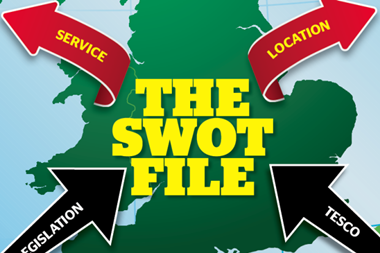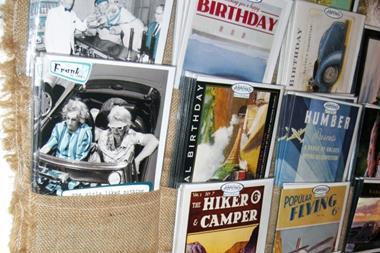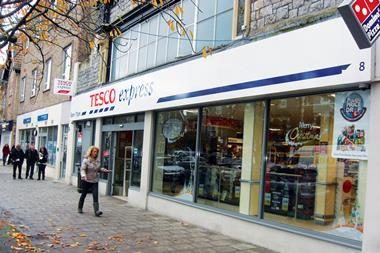Who makes their customers feel at home by greeting them by name? Who can move fast to stock what they want? You can. Accentuate the positive and you’ll have the upper hand
There’s no doubt that times are tough and making ends meet is a challenge. Plenty of convenience retailers have seen sales growth slow, plateau, or drop in recent months, and stories about growth of the multiples are never far from the headlines. But while there’s no denying that Tesco, Sainsbury’s and Co boast plenty of strengths, they don’t hold all the aces.
They lack the personality and the entrepreneurial flair of independents, as well as the ability to build a rapport with customers that only comes through knowing your shoppers. And, lest we forget, convenience stores are just that - convenient. They are within walking distance and packed with essentials. But it’s not enough simply to rely on these assets. You need to take the time to polish and fine-tune them to really capitalise.
LOCATION
When a consumer runs out of something at home, fancies a product on the spur of the moment, or needs to top up on key items, they are highly likely to walk into a c-store, rather than drive to a supermarket. In fact, 85% of consumers believe convenience store shopping is easier than visiting chain supermarkets, according to HIM.

Whether you are in the heart of your village, or on a busy shopping parade, you can’t rely on a good location alone. The trick is to understand who shops at your store and tailor your product range accordingly.
Baba Butt, who owns three stores in Tilehurst, Reading, Berkshire, ensures he tailors his range to his customer base. “There is a lot of council housing in the area, and they tend to be very money conscious,” he says. To meet their needs, he ensures that all the essentials are affordable. “Milk, bread, beans and sugar are permanently on offer and cheaper than the supermarkets. I also provide free ATMs so people come to get cash out and then tend to spend money in the store.”
There are two or three schools by each store, which Baba caters for with a range of pre- and post-school snacks and pick ‘n’ mix.
John Cuthbertson’s Premier store is in a prime location on the campus of Dundee University. He makes the most of this by making his product range student friendly with a strong range of convenience products such as pizza and ready meals for freshers, but also a cook-from-scratch offering for older students. “We also stock a strong range of energy drinks, which tend to sell particularly well in the run up to exams,” he says.
Value for money is also a key requirement for the hard-up students, and pack sizes are kept small just for them.
INDEPENDENCE
Perhaps one of the sector’s most overlooked strengths is independence itself. HIM research shows that almost a quarter (23%) of consumers don’t know whether or not their local store is independent, but almost a third (31%) would use their local store more often if they knew it was independent.
Budgens of Whitstable and Blean Village Londis owner Binny Amin certainly uses his independence to his advantage. “In these parts independent retailers are highly valued, so getting the message out there that I am an independent business that supports local suppliers is really important.” He adds: “When we opened both stores we sent out newsletters - not to promote products and services, but to explain who we are and what we can offer.”

Binny has also worked hard to let shoppers know that being independent means they can adapt to shoppers’ needs. For example, when customers noted that a certain product was too high up to reach, it was re-positioned to a more convenient location. And when customers requested more gluten-free products, Binny came up trumps.
“We have also put up a noticeboard where customers can place suggestions and we’ll reply every week to explain what updates we’ve made,” he says.
Coventry Costcutter retailers Paul and Pinda Cheema are experts in using their independence to win over customers. In fact, the shop is often referred to as ‘Malcolm’s Store’, after their father who previously ran the store. Paul and Pinda ensure that Malcolm’s presence is still strong in-store with a large photo of him with wife Baljit displayed alongside a welcome message, explaining to customers that the store has been in the family since 1986, and signage reinforces this.
Says Paul: “The reason you join a symbol group is because of the strength of the brand, but you also need to ensure customers understand that the shop is independently run and that you have tailored your offering based on what suits your customers.”
CUSTOMER SERVICE
Convenience stores certainly have the upper hand when it comes to customer service perceptions. HIM research shows that more than three-quarters of consumers agree that convenience store staff are friendlier than those in larger stores, while 86% agree they get outstanding speed of service. However, excellent service doesn’t just happen automatically.

“Customer service is vital as customers drive the business,” says 2012 Sales Assistant of the Year Daniel Hill, from Spar Lambeg in Northern Ireland. “If a customer comes to our store and has a fantastic experience, but then gets to the tills and isn’t greeted properly, then they will only remember the bad things and won’t come back.”
Daniel created a script for cashiers to ensure that they remembered to smile, chat and make eye contact with customers. Staff also use their time with shoppers to upsell particular products. According to HIM, 81% of CTN shoppers wouldn’t mind if staff suggested a product to buy, but only 5% said staff did up-sell.






























3 Readers' comments